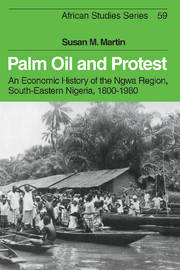Book contents
- Frontmatter
- Contents
- List of maps and figure
- Acknowledgements
- Abbreviations
- 1 Introduction
- 2 Ecology, society and economic change to 1891
- 3 The Ngwa and colonial rule, 1891–1914
- 4 The expansion of the oil palm industry, 1884–1914
- 5 The end of the boom
- 6 Cassava and Christianity
- 7 Authority, justice and property rights
- 8 Trade, credit and mobility
- 9 Production and protest: the Women Riot, 1929
- 10 Cash cropping and economic change, 1930–80
- 11 Conclusion
- Statistical appendix
- Notes
- Interviews conducted in the Ngwa region, 1980–1
- Bibliography
- Index
3 - The Ngwa and colonial rule, 1891–1914
Published online by Cambridge University Press: 11 September 2009
- Frontmatter
- Contents
- List of maps and figure
- Acknowledgements
- Abbreviations
- 1 Introduction
- 2 Ecology, society and economic change to 1891
- 3 The Ngwa and colonial rule, 1891–1914
- 4 The expansion of the oil palm industry, 1884–1914
- 5 The end of the boom
- 6 Cassava and Christianity
- 7 Authority, justice and property rights
- 8 Trade, credit and mobility
- 9 Production and protest: the Women Riot, 1929
- 10 Cash cropping and economic change, 1930–80
- 11 Conclusion
- Statistical appendix
- Notes
- Interviews conducted in the Ngwa region, 1980–1
- Bibliography
- Index
Summary
British rule was gradually extended over the hinterland of eastern Nigeria from 1891, but the Ngwa had remarkably little direct experience of colonial rule before 1914. The small white community which was established at Aba in 1902 intervened sparingly in the lives of its African neighbours and made rare forays into the surrounding region. It is difficult to discover much about the relationship between local officials and those subjects with whom they did establish contact, since record-keeping was poor and few documents have survived. However, it is possible to piece together a general picture of British colonial rule in eastern Nigeria from higher-level sources. In this chapter we will use this material, and the few available local records, to explain why the early colonial presence was so remote and to trace the origins of attitudes and policies that were later to affect Ngwa life more directly.
British colonial rule was established slowly and piecemeal in eastern Nigeria, over a period of thirty years. In 1884 Consul Hewett began the process by making a series of treaties of protection with coastal rulers, and in 1891 the Niger Coast Protectorate was established with the ultimate aim of securing British authority in the hinterland. However, the conquest of the hinterland began in earnest only with the launching of the Aro Expedition in 1901; and it was concluded only with the suppression of a wave of wartime revolts in 1914–16.
Financial constraints underlay this slow pace of action and continued to influence the development of economic and administrative policy in newly conquered regions.
- Type
- Chapter
- Information
- Palm Oil and ProtestAn Economic History of the Ngwa Region, South-Eastern Nigeria, 1800–1980, pp. 36 - 44Publisher: Cambridge University PressPrint publication year: 1988



